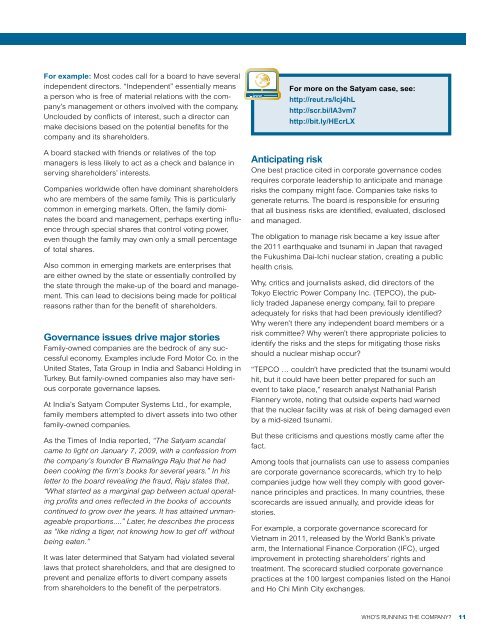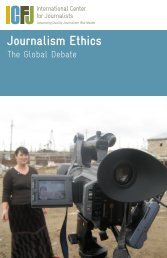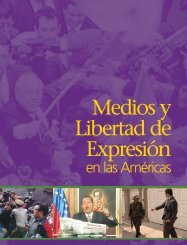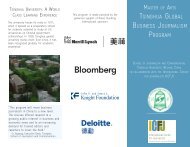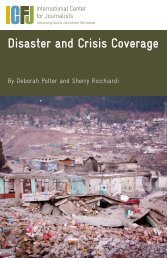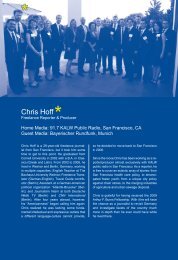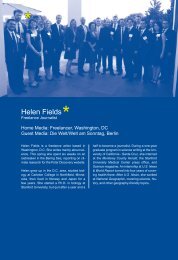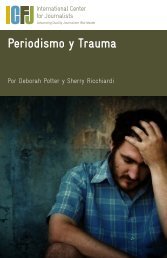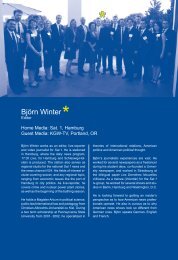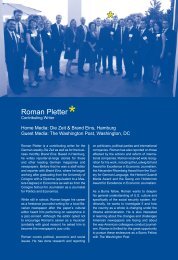Who's Running the Company? - International Center for Journalists
Who's Running the Company? - International Center for Journalists
Who's Running the Company? - International Center for Journalists
You also want an ePaper? Increase the reach of your titles
YUMPU automatically turns print PDFs into web optimized ePapers that Google loves.
For example: Most codes call <strong>for</strong> a board to have several<br />
independent directors. “Independent” essentially means<br />
a person who is free of material relations with <strong>the</strong> company’s<br />
management or o<strong>the</strong>rs involved with <strong>the</strong> company.<br />
Unclouded by conflicts of interest, such a director can<br />
make decisions based on <strong>the</strong> potential benefits <strong>for</strong> <strong>the</strong><br />
company and its shareholders.<br />
A board stacked with friends or relatives of <strong>the</strong> top<br />
managers is less likely to act as a check and balance in<br />
serving shareholders’ interests.<br />
Companies worldwide often have dominant shareholders<br />
who are members of <strong>the</strong> same family. This is particularly<br />
common in emerging markets. Often, <strong>the</strong> family dominates<br />
<strong>the</strong> board and management, perhaps exerting influence<br />
through special shares that control voting power,<br />
even though <strong>the</strong> family may own only a small percentage<br />
of total shares.<br />
Also common in emerging markets are enterprises that<br />
are ei<strong>the</strong>r owned by <strong>the</strong> state or essentially controlled by<br />
<strong>the</strong> state through <strong>the</strong> make-up of <strong>the</strong> board and management.<br />
This can lead to decisions being made <strong>for</strong> political<br />
reasons ra<strong>the</strong>r than <strong>for</strong> <strong>the</strong> benefit of shareholders.<br />
Governance issues drive major stories<br />
Family-owned companies are <strong>the</strong> bedrock of any successful<br />
economy. Examples include Ford Motor Co. in <strong>the</strong><br />
United States, Tata Group in India and Sabanci Holding in<br />
Turkey. But family-owned companies also may have serious<br />
corporate governance lapses.<br />
At India’s Satyam Computer Systems Ltd., <strong>for</strong> example,<br />
family members attempted to divert assets into two o<strong>the</strong>r<br />
family-owned companies.<br />
As <strong>the</strong> Times of India reported, “The Satyam scandal<br />
came to light on January 7, 2009, with a confession from<br />
<strong>the</strong> company’s founder B Ramalinga Raju that he had<br />
been cooking <strong>the</strong> firm’s books <strong>for</strong> several years.” In his<br />
letter to <strong>the</strong> board revealing <strong>the</strong> fraud, Raju states that,<br />
“What started as a marginal gap between actual operating<br />
profits and ones reflected in <strong>the</strong> books of accounts<br />
continued to grow over <strong>the</strong> years. It has attained unmanageable<br />
proportions....” Later, he describes <strong>the</strong> process<br />
as “like riding a tiger, not knowing how to get off without<br />
being eaten.”<br />
It was later determined that Satyam had violated several<br />
laws that protect shareholders, and that are designed to<br />
prevent and penalize ef<strong>for</strong>ts to divert company assets<br />
from shareholders to <strong>the</strong> benefit of <strong>the</strong> perpetrators.<br />
For more on <strong>the</strong> Satyam case, see:<br />
http://reut.rs/Icj4hL<br />
http://scr.bi/IA3vm7<br />
http://bit.ly/HEcrLX<br />
Anticipating risk<br />
One best practice cited in corporate governance codes<br />
requires corporate leadership to anticipate and manage<br />
risks <strong>the</strong> company might face. Companies take risks to<br />
generate returns. The board is responsible <strong>for</strong> ensuring<br />
that all business risks are identified, evaluated, disclosed<br />
and managed.<br />
The obligation to manage risk became a key issue after<br />
<strong>the</strong> 2011 earthquake and tsunami in Japan that ravaged<br />
<strong>the</strong> Fukushima Dai-Ichi nuclear station, creating a public<br />
health crisis.<br />
Why, critics and journalists asked, did directors of <strong>the</strong><br />
Tokyo Electric Power <strong>Company</strong> Inc. (TEPCO), <strong>the</strong> publicly<br />
traded Japanese energy company, fail to prepare<br />
adequately <strong>for</strong> risks that had been previously identified?<br />
Why weren’t <strong>the</strong>re any independent board members or a<br />
risk committee? Why weren’t <strong>the</strong>re appropriate policies to<br />
identify <strong>the</strong> risks and <strong>the</strong> steps <strong>for</strong> mitigating those risks<br />
should a nuclear mishap occur?<br />
“TEPCO … couldn’t have predicted that <strong>the</strong> tsunami would<br />
hit, but it could have been better prepared <strong>for</strong> such an<br />
event to take place,” research analyst Nathanial Parish<br />
Flannery wrote, noting that outside experts had warned<br />
that <strong>the</strong> nuclear facility was at risk of being damaged even<br />
by a mid-sized tsunami.<br />
But <strong>the</strong>se criticisms and questions mostly came after <strong>the</strong><br />
fact.<br />
Among tools that journalists can use to assess companies<br />
are corporate governance scorecards, which try to help<br />
companies judge how well <strong>the</strong>y comply with good governance<br />
principles and practices. In many countries, <strong>the</strong>se<br />
scorecards are issued annually, and provide ideas <strong>for</strong><br />
stories.<br />
For example, a corporate governance scorecard <strong>for</strong><br />
Vietnam in 2011, released by <strong>the</strong> World Bank’s private<br />
arm, <strong>the</strong> <strong>International</strong> Finance Corporation (IFC), urged<br />
improvement in protecting shareholders’ rights and<br />
treatment. The scorecard studied corporate governance<br />
practices at <strong>the</strong> 100 largest companies listed on <strong>the</strong> Hanoi<br />
and Ho Chi Minh City exchanges.<br />
WHO’S RUNNING THE COMPANY?<br />
11


